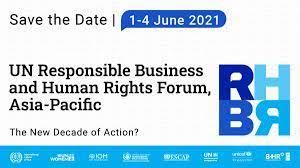
https://www.rbhrforum.com/copy-of-home-1
Here the sessions organized by UN-OHCHR:
https://bangkok.ohchr.org/rbhr2021/
United Nations Responsible Business and Human Rights Forum The New Decade of Action?
09:30 - 11:00 (Bangkok time, GMT+7), 1 June 2021
Background
Ever since the pandemic broke out, COVID-19 is having a devastating impact on society. The pandemic
has profoundly impacted the world of work, with 81 million people losing their employment in Asia and
the Pacific alone. With increased unemployment, young workers are likely to find it challenging to
compete for jobs, and studies indicate that it could take years for those women who exited the labour
force to return to full employment. Emerging research also estimates that COVID-19 has increased the
time needed to close the global gender gap from 99.5 years to 135.6 years. Similarly, migrants and
informal workers remained at a higher risk of contracting COVID-19 and suffering from its socio-economic
fallout, while border closures and lockdowns leave many vulnerable to exploitation. Finally, the pandemic
raises questions about the universal and equitable distribution of vaccines.
These issues come against a wider context of issues relating to responsible business, including climate
change and environmental degradation, biodiversity loss, rising inequality, shrinking civic space and lack
of accountability, among numerous other issues. As the ongoing COVID-19 crisis has laid bare pre-existing
protection gaps, it has become clear that there is an urgent need for structural and systemic change to
realize sustainable development for all. To be sure, we can make progress on all of these often interrelated
challenges. To do so, however, we must make this a decade of meaningful action.
The call for a decade of action could not be more timely as 2021 marks the final ten years to achieve the
2030 Agenda for Sustainable Development and the Sustainable Development Goals (SDGs). At the SDG
Summit in September 2019, world leaders called for a Decade of Action, pledging to mobilize financing,
enhancing national implementation and strengthening institutions to achieve the Goals by the target date
of 2030. Moreover, June 2021 marks the tenth anniversary of the UN Human Rights Council’s
endorsement of the UNGPs. On this occasion, the UN Working Group on Business and Human Rights
(UNWG) will provide a report outlining the progress made to date in implementing the UNGPs. The UNWG
will also present a roadmap for the next decade, setting out an implementation strategy with goals and
targets for States, business enterprises and associations, international organizations and other actors for
the next decade.
Availability of resources and the ability to innovate, scale, and reach make businesses an important
stakeholder in achieving the 2030 Agenda. At the same time, we cannot achieve the SDGs without States
and businesses honouring their human rights responsibilities. As the UNGPs offer a blueprint on how
States and businesses can prevent and address human rights abuses, they have a tremendous potential
to influence the next decade of action positively.
Against this background, June 2021 presents an opportune moment for us to reflect and recalibrate. In
this context, several UN entities in the Asia-Pacific region have joined hands to organize the 3rd UN Responsible Business and Human Rights Forum. The Forum will be held during 1-4 June 2021, and co-
organized by the International Labour Organization (ILO), International Organization for Migration (IOM),
United Nations Children’s Fund (UNICEF), United Nations Development Programme (UNDP), United
Nations Economic and Social Commission for Asia and the Pacific (ESCAP), United Nations Entity for
Gender Equality and the Empowerment of Women (UN Women), United Nations Environmental
Programme (UNEP), and UN Working Group on Business and Human Rights (UNWG).
About Responsible Business and Human Rights Forum
Held annually since 2016, the Responsible Business and Human Rights Forum convenes governments,
civil
society organizations, human rights defenders, trade unions, academia, national human rights
institutions, business enterprises and industry associations for constructive dialogue and peer-learning
on
how to strengthen responsible business and human rights in the region. The 2021 Forum will convene
stakeholders in the Asia-Pacific region to take stock of progress and discuss challenges and opportunities
for advancing responsible business in the region. It will explore how existing vulnerabilities have been
exposed and amplified by the ongoing pandemic and discuss the need to view the crisis as an opportunity
to drive change.
Objectives:
The Forum aims to:
-
Track the progress of governments and businesses in implementing the UNGPs and achieving
-
the SDGs, and assess enablers and barriers in promoting responsible business in the Asia Pacific;
-
Assess the impact of COVID-19 on promoting responsible business in line with the UNGPs and
-
achieving the SDGs;
-
Explore how governments, businesses, civil society actors and others can collaborate on
-
post-COVID- 19 recovery, with a focus on responsible business and standards;
-
Explore how to achieve accountability of States and businesses and ensure universal access to
-
remedy for victims of business-related human rights abuse;
-
Assess opportunities and the role of the youth in adopting and promoting responsible business in
-
the next decade of action;
-
Raise awareness, enhance commitment and build the capacity of various stakeholders around
-
responsible business and human rights issues and standards;
-
Discuss how to rebuild the global economy in a more inclusive way to increase sustainability and
-
resilience while addressing disproportionate impacts on children, women, migrants, young workers
-
and others;
-
Identify and share good business practices that respect people and the planet;
-
Facilitate learning and networking opportunities for CSOs and human rights defenders, and
-
evaluate how they can advocate for change and overcome barriers to access remedy; and
-
Encourage peer-learning among States, businesses, industry associations, trade unions, CSOs
-
and National Human Rights Institutions (NHRIs) in the Asia-Pacific region, facilitating the regional
-
exchange of good practices.










Add new comment